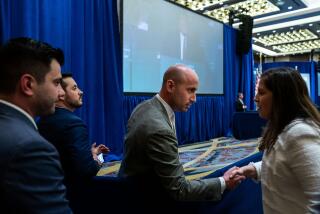Denny’s Takes Its Case to the Airwaves
- Share via
Sporting one of the worst shiners in American corporate history, Denny’s is trumpeting what it calls a top-to-bottom make-over.
In recent weeks, Denny’s’ corporate parent, Advantica Restaurant Group Inc., has purchased television time for a 27-minute company-produced documentary titled “The Denny’s Turnaround.” The program, which has aired in Washington and New York and just landed in reporters’ mailboxes, is part of a multimillion-dollar image-polishing campaign designed to persuade minorities that these days, Denny’s is different.
It’s going to be a tough sell, Advantica executives acknowledge, as challenging as Texaco Inc.’s efforts to remedy its own race debacle and those of Exxon Corp. to cleanse itself after the Exxon Valdez oil spill.
Memories of “the incident,” as it’s known in Advantica’s South Carolina headquarters, haven’t faded. In 1993, a group of African American Secret Service officers fumed as they waited more than an hour for breakfast in an Annapolis, Md., Denny’s, while white colleagues who arrived at the same time feasted at a nearby table.
The officers filed a class-action race-discrimination lawsuit against the chain, and the case, joined with a similar one in California, was eventually settled for $54 million. Denny’s became a national punch line and a symbol of the resilience of racism in America.
Now the company is spending lavishly to promote what it considers a cultural overhaul. The effort isn’t merely about doing the right thing. Under terms of a consent decree it signed with the Justice Department, a civil rights monitor keeps tabs on all of Denny’s 1,721 restaurants, and a contempt citation and possibly fines could result from enough negative feedback. With good marks, the monitor’s work could be over after five years, rather than seven.
Just as important, the company has concluded that its chain of mid-priced family restaurants will eventually fail if it alienates blacks and Latinos.
“As this country grows in the next 15 years, the racial composition of the country will change dramatically,” said John Romandetti, Denny’s chief executive. “And if you’re not in touch with the tastes of minorities or in a position to reach them through ads, you’re going to miss an incredible opportunity.”
Whatever the motivations, Romandetti says Denny’s has earned bragging rights for its efforts and has lined up unlikely endorsements to vouch for its progress. Hugh Price, president of the National Urban League, makes a cameo appearance in the Denny’s video to praise Advantica Chief Executive Jim Adamson.
“My take is that Adamson has made a good-faith and concerted effort to root out these problems,” Price said in an interview Monday. “He’s come down hard on people who’ve strayed from the program.”
Just as improbably, there’s a testimonial on the video from John Relman, a lawyer at the Washington Lawyer’s Committee for Civil Rights and the attorney for the six officers who sued.
“I’m reluctant to praise corporations on stuff like this,” Relman said recently, “but they’re pretty much a model of how to turn a company around. New management came in and said, ‘These people before us screwed up, and we’re going to take the issue of race head-on.’ ”
The company’s public relations office is delighted to share statistics. In 1993, just one Denny’s franchise was owned by an African American; today, more than a dozen blacks and other minorities own 36% of Denny’s 737 franchised restaurants.
In 1992, no Advantica’s contract supplier was a minority-owned firm. Today, the company does $125 million worth of business with minority-owned companies, about 18% of its business. Nearly half of Denny’s 50,000-person work force is African American, as is one-third of Advantica’s management team. The company’s 12-member board of directors, meanwhile, includes three blacks and one Latino.
The changes earned praise in a “60 Minutes” report last fall and landed Denny’s in the No. 2 spot on Fortune’s list of the 50 best companies for minorities in 1998, a survey that analyzed promotion and hiring patterns.
More to Read
Inside the business of entertainment
The Wide Shot brings you news, analysis and insights on everything from streaming wars to production — and what it all means for the future.
You may occasionally receive promotional content from the Los Angeles Times.










